It is like a theatre room, with revolving stages where the characters change scenery every six minutes.
In the corridor with arrows marked in blue or red on the floor, there are just as many clinical stories to follow and decode. They know all about these brief stories in general terms from the sheets posted on the wall, which indicate where they are in the assessment process. Waiting for them is always an interacting duo, the patient and the examiner. Both are doctors and some are teachers, but at that moment the past is erased, like in a play where characters are embodied, without experience, nor joint or shared memory.
There are 10 cases in which they will have to assume the role of the doctor who enters a new room and does not know exactly what awaits him/her, or what specialty he/she is going to analyse.
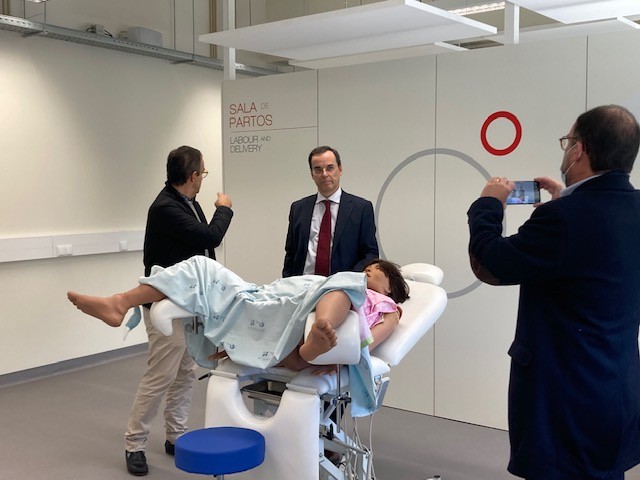
They follow the instructions through a previously recorded voiceover by Diogo Ayres de Campos, Professor and Director of the Obstetrics/Gynaecology University Clinic and coordinator of the OSCE-Objective Structured Clinical Examination – the new form of practical assessment in the clinical years of the FMUL and which replaces the hitherto conventional oral and written assessments. The timed and rotating process of assessment aims to create interactions between the future doctor and the patient, assuming that the time pressure and observation factor are latent and showing that for a good performance one cannot only know about clinical practice, but must observe beyond what one is told, or shown.
"Enter the station. One minute left. Change station", the indications are heard so that everyone knows the next step to take. In the control room the slides with the word of command are accompanied by the voice, automatically timed and without waiting for delays or change of course, everything happens at the same rhythm whether or not harmony is present among the medical students. Diogo Ayres de Campos and Cristiano Tavares (the engineer who has been following the process of the Technological Centre) circulate among the corridors, to give small guidelines of the way, but without much interaction.
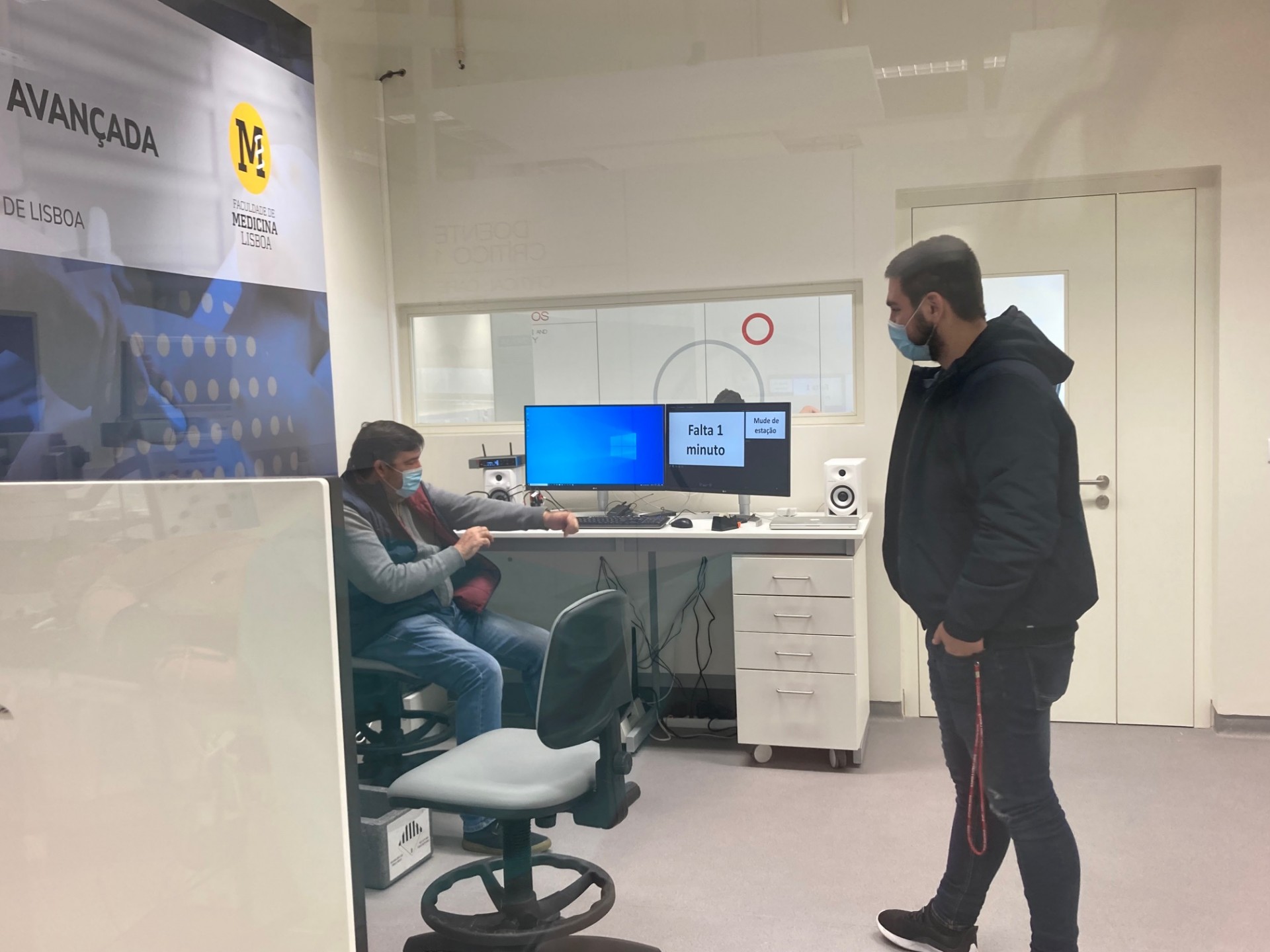
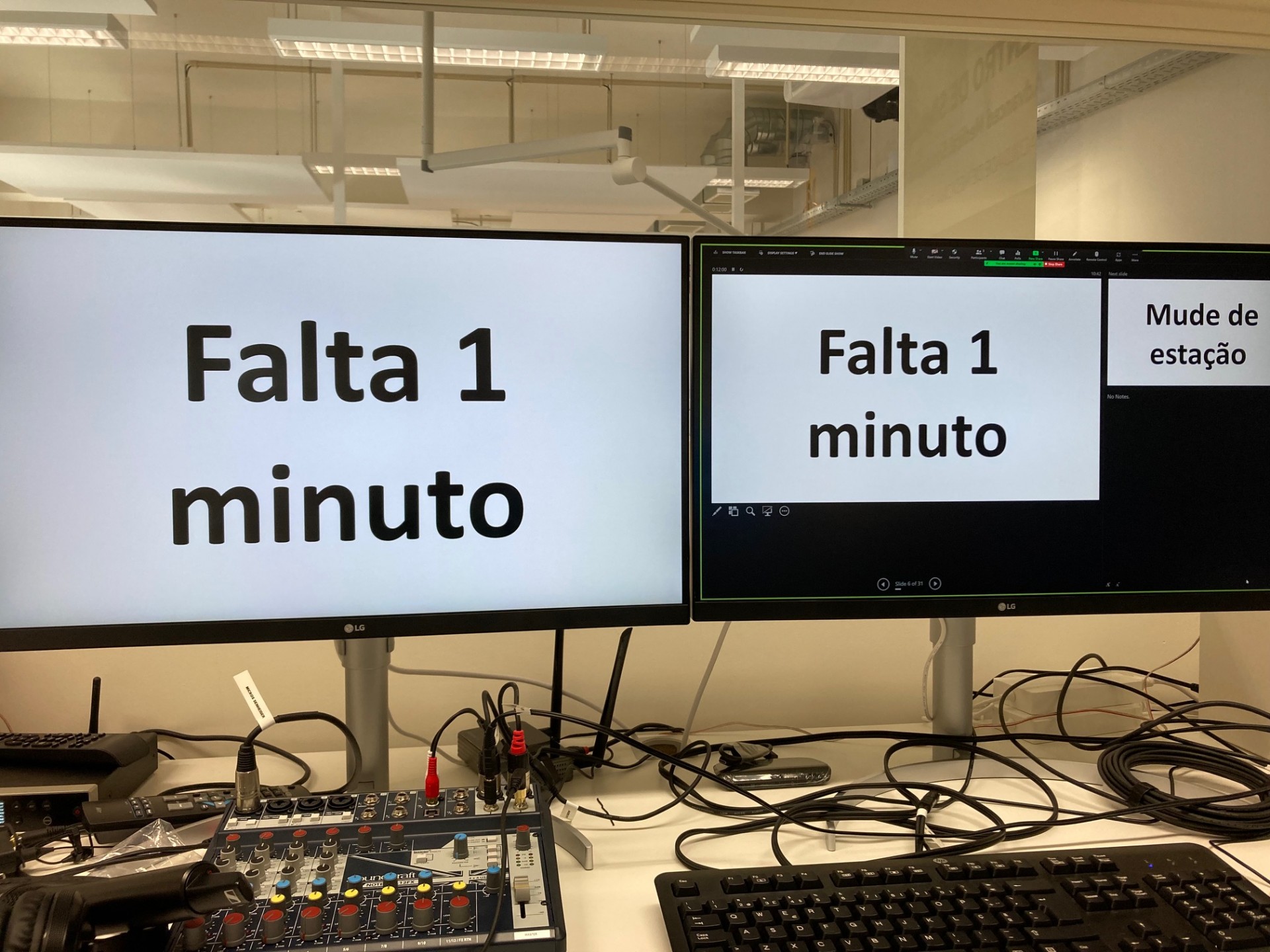
Early in the morning, from 7:45 a.m., the first 80 medical students start doing the maths for the hours they will spend together and managing the anxiety of being the first to go through the pioneering assessment implemented in the clinical years of the Integrated Master Degree in Medicine. Of the 160 students allocated to each day, out of a total of 320 4th year students, the thematic blocks to be assessed are divided. On the first day the semester of Family Medicine, Ophthalmology, Otolaryngology, Psychiatry and Neurosciences, the following day the semester block of Surgical areas and Internal Medicine.
Over the course of 1 hour, groups of 20 students make their way through the rooms presenting the clinical cases. In a total of 40 students at the same time, the teams follow different circuits so that everyone has the same opportunity to experience all the stations. One or two cases were lost along the circuit, but few were those who felt discouraged at the end of this silent hour they were put to the test.

What have you done internationally within the OSCE?
Diogo Ayres de Campos: The OSCEs have been around for a few years now, and I have around 5 years of experience in conducting this exam. From 2017 I started to coordinate the OSCE of the specialty of the European College of Obstetrics and Gynaecology, which started in England, then was two years in Amsterdam and arrived for the first time in Lisbon in 2019. In 2020 the OSCE was cancelled due to the pandemic and in 2021 this exam was held online, and it was not possible to evaluate the technical aspects.
And in Portugal, what have you done to implement this model of examination?
Diogo Ayres de Campos: Implementing this exam in the FMUL pre-graduate programme is challenging, because the number of students is very high, the teaching teams are larger, and only a few subject areas had practical experience of the exam. At European level there was already a team that carried out OSCEs locally, and so everything is easier to set up. At the FMUL everything had to be set up from scratch and the Pedagogical Council started working harder on the project in May last year. The FMUL Advanced Simulation Centre has the ideal space, the ideal technical conditions to carry out this type of exam. What I intend this year is that the European OSCE in Gynaecology and Obstetrics can also be held at the Simulation Centre.
I was very pleased to participate in this pioneering organization of the OSCEs at the FMUL, and to make my contribution to the start-up. From the second semester onwards I will hand over the coordination to Prof. Patrício Aguiar, who will be responsible for organising future 4th year OSCEs.
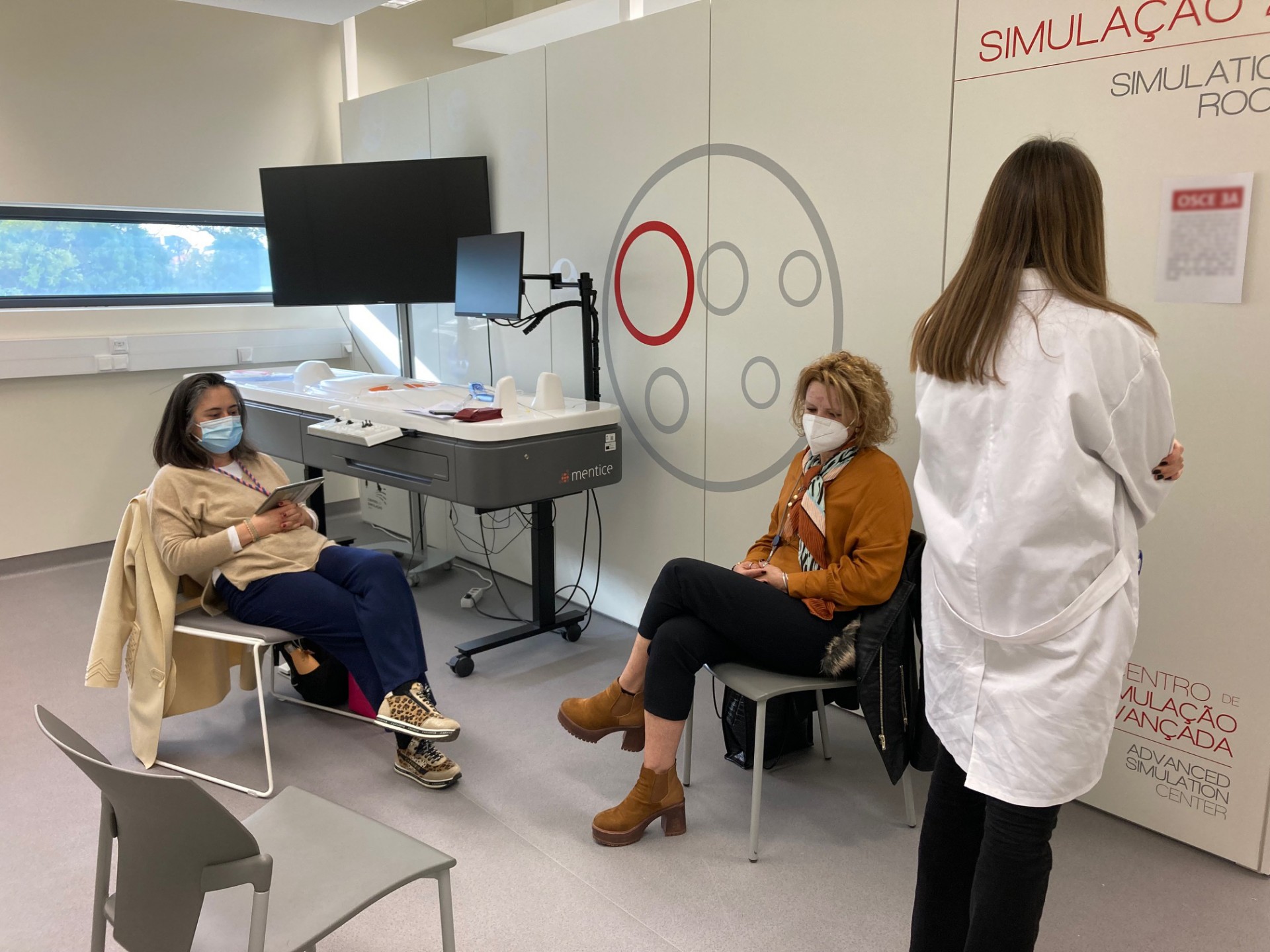
Does it take many hours to prepare an exam day?
Diogo Ayres de Campos: Yes... first we need to analyse the pedagogical objectives of each subject because these are the only skills we want to assess. Then a script has to be made with the instructions for the students, which cannot be too long because they only have 1 minute to read and learn them before entering each station. A script also has to be prepared for the simulated patient, because there are phrases that have to be said in a structured way and there can't be too much improvisation[PE1] . Finally, it is necessary to have a careful evaluation of each item on the evaluation grid.
As it was the first time we prepared this test, each subject area made a proposal of its own evaluation grid and in the end they were all revised by me, because I already had some experience with this model of international examinations. However, the final versions of the texts were the responsibility of the subject areas. We prepared the assembly of the scenarios and circuits, with arrows on the floor so that the students could walk along the route without getting lost. We are talking about an assessment that lasted 2 full days, with more than 340 students assessed, in other words, a total of around 3400 stations completed. Naturally, a great deal of preparation and organisation is required of the whole team. We held a pilot OSCE in December to practice the most essential aspects and also to pass on the experience to the students, so that they would not be surprised at the time of the assessment. I want to emphasize that the realization of these two days of OSCEs would have been possible without a great team of the FMUL Professors and collaborators, who are mainly responsible for the preparation and realization of this test. I think that the fact that subject areas talk to each other in the preparation and at the time of assessment is a plus, because it allows people to be inspired by each other, which can catalyse important changes in teaching. This exam happens because the subject areas produce the OSCE scripts, the examiners and the actors, being primarily responsible for the quality and success of the exam. Regarding the organisation of the exam, I would like to highlight the excellent work of the academic areas' staff, coordinated by Luísa Pires, the exam assessment support by Pedro Mendes, the IT support of Pedro Marçal and Rui Fonseca, and the organisation at the Simulation Centre of Cristiano Oliveira. The assessment carried out directly through the computer program allowed the grades to be posted two days after the OSCE took place.
What is the importance of this test in an assessment aimed at training future doctors?
Diogo Ayres de Campos: In Medicine, knowledge is very important in determining the diagnosis, treatment and appropriate monitoring. But if we cannot convey this information to the patient in a way that he/she understands, we are not being good doctors. In Medicine, there are also procedures that require great precision of movement, and great training to be able to perform them. In fact, being a doctor includes all these components that we call medical competences, and in the past it was not possible for us to evaluate this rigorously. From the moment that these skills become part of the assessments, we place much greater emphasis on their training during the school year.
Do you feel, even more, the weight of responsibility for being the first time that the OSCE takes place at the FMUL?
Diogo Ayres de Campos: Yes of course, it is very important that these exams go well especially the first times to motivate everyone involved.
Sometimes there can be a tendency to turn OSCEs into an oral examination, and instead of assessing technical and communication skills with patients we go back to assessing knowledge. It is necessary to avoid this, because the OSCE is an assessment method that implies a great investment of time, resulting from the number of hours that the teaching team and the organisational team spend in order for this test to take place. It is essential that the OSCE is used to assess skills that are not possible to assess in a multiple-choice test.
Do students know what will be assessed at each station?
Diogo Ayres de Campos: The students know, from the beginning of the school year, which areas of knowledge will be involved in the OSCE. But when they enter a new station they don't know which specialty area they will find. In real life, when a patient comes into our practice for the first time, they usually don't already have a diagnosis that fits only one area of knowledge. This exam purpose is to assess these skills in students and prepare them for the daily routine of a doctor.
This exam model has already taken place, on 31 January and 1 February. Is it a formula for assessment that will continue?
Diogo Ayres de Campos: That is a decision that belongs to the Pedagogical Council and the Board of Directors of the FMUL, but in my opinion these assessments should come to stay, because Medical Schools should be concerned with the teaching of all the competencies needed by today's doctors. The OSCE assessments are fair, because they are objective, detailed and structured. This is where their added value lies.
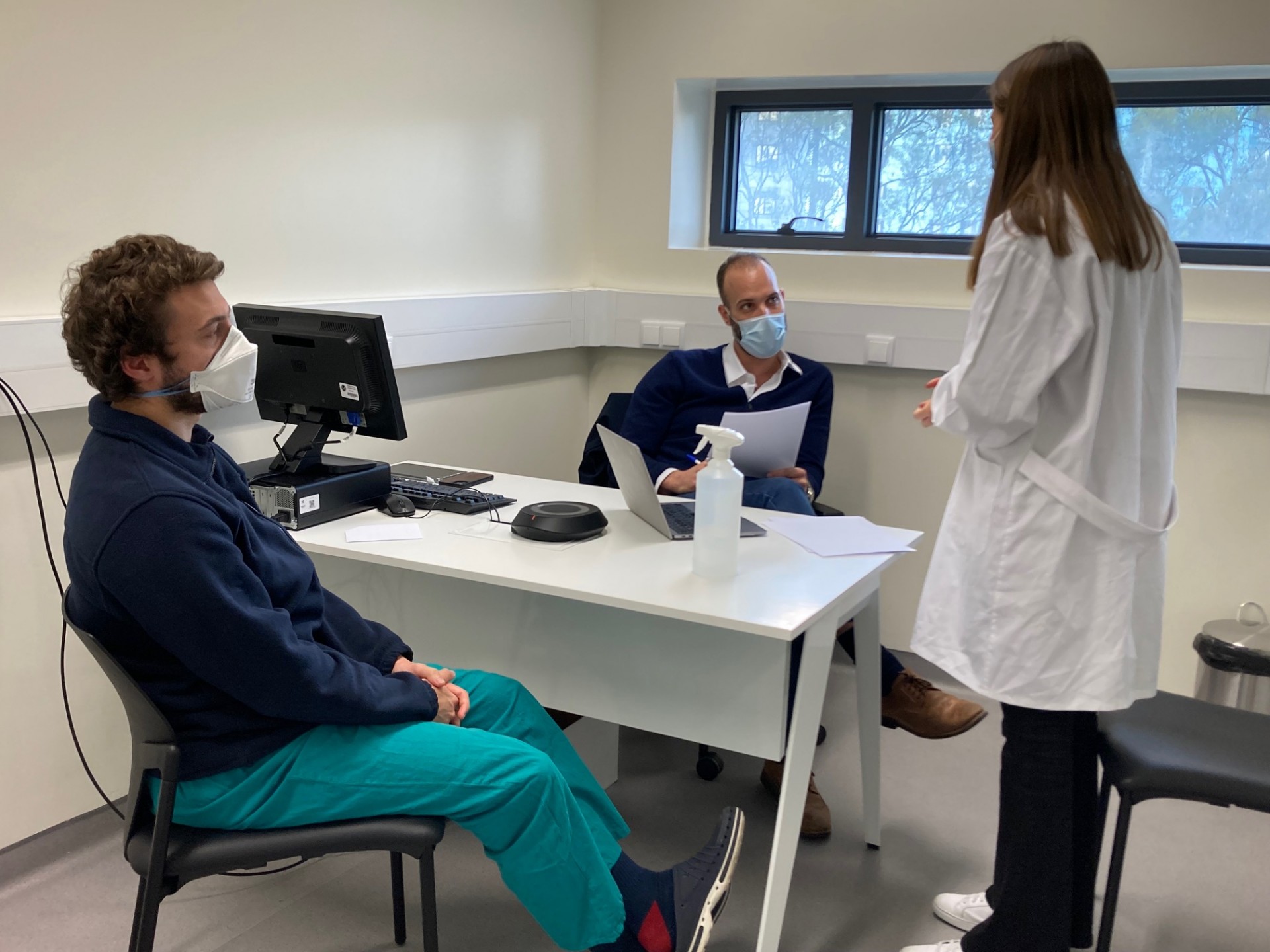

There are several familiar faces, teachers recognise faces already seen in their theory classes. "Oh, I’ve seen this face” and smile, immediately embodying the new role of a stranger who comes to complain of something he/she hardly knows what it is. Some are more relaxed in the communicational process, others with trembling hands, scribble on a piece of paper the notes of what they consider important to ask. The heavy silence is present in the rooms, giving these students the weight of responsibility. Among the more than 60 elements that fill the entire space of the Advanced Simulation Centre at the Technological Centre for Advanced Medicine, there is not a noise out of place, nor a distraction escape.
While examining the hand of someone complaining of numbness, a student asked the assessment monitor if she could apply stimuli to the patient, to check for nerve reactions. "Press wherever you like, it's your patient and we are here at your service," the monitor replied. Later, this same "apprentice" subjected to the assessment and without certainty of success, confided to think as necessary in previous lessons some more interactions, never experienced before until the moment of the assessment. Despite this difficulty of interaction, it was clear to her that great learning steps were being taken in a new reality of more practical and interactive assessment.
It is easy for us to understand what goes through the head of a young medical student who has to pretend to be a doctor in front of his/her professors, with tablets in hand and whose areas of expertise are precisely the ones he/she is trying to play the best role. "We can't be too ruthless, otherwise we might break their confidence and they still really need encouragement and self-esteem. They are generally all very good, but fear can betray them in these moments of pressure and we have to encourage them, not destroy expectations", confided one of the teachers playing the role of the patient. Once the evaluation was over and without compromising any behaviour or the evaluation, the same teacher would give final clinical advice that will never be forgotten. "If a similar case comes your way, don't say that, perhaps, surgery is necessary. You have to say that surgery is urgent!".
At the end of a group's circuit, which lasted an hour, there was a short break that brought all the doctors and monitors together in a single room. In a comfortable coffee break, masterfully organised by the team of collaborators of the Faculty, the teachers exchanged ideas about what the students were feeling, and evaluated performances. Between the patronizing behaviour of the older doctors and the greater distancing of the younger ones, which made interaction with the 4th year students a little more difficult, Diogo Ayres de Campos hurriedly swallowed some juice while going from one room to the next to confirm that the transitions were done properly and that the tablets were operational.
Communicating is not easy, especially when time runs out in five minutes of interaction, or because the change of station is a new beginning in another case, with other participants. A rollercoaster of unexpected cases and dynamics that can never be controlled.
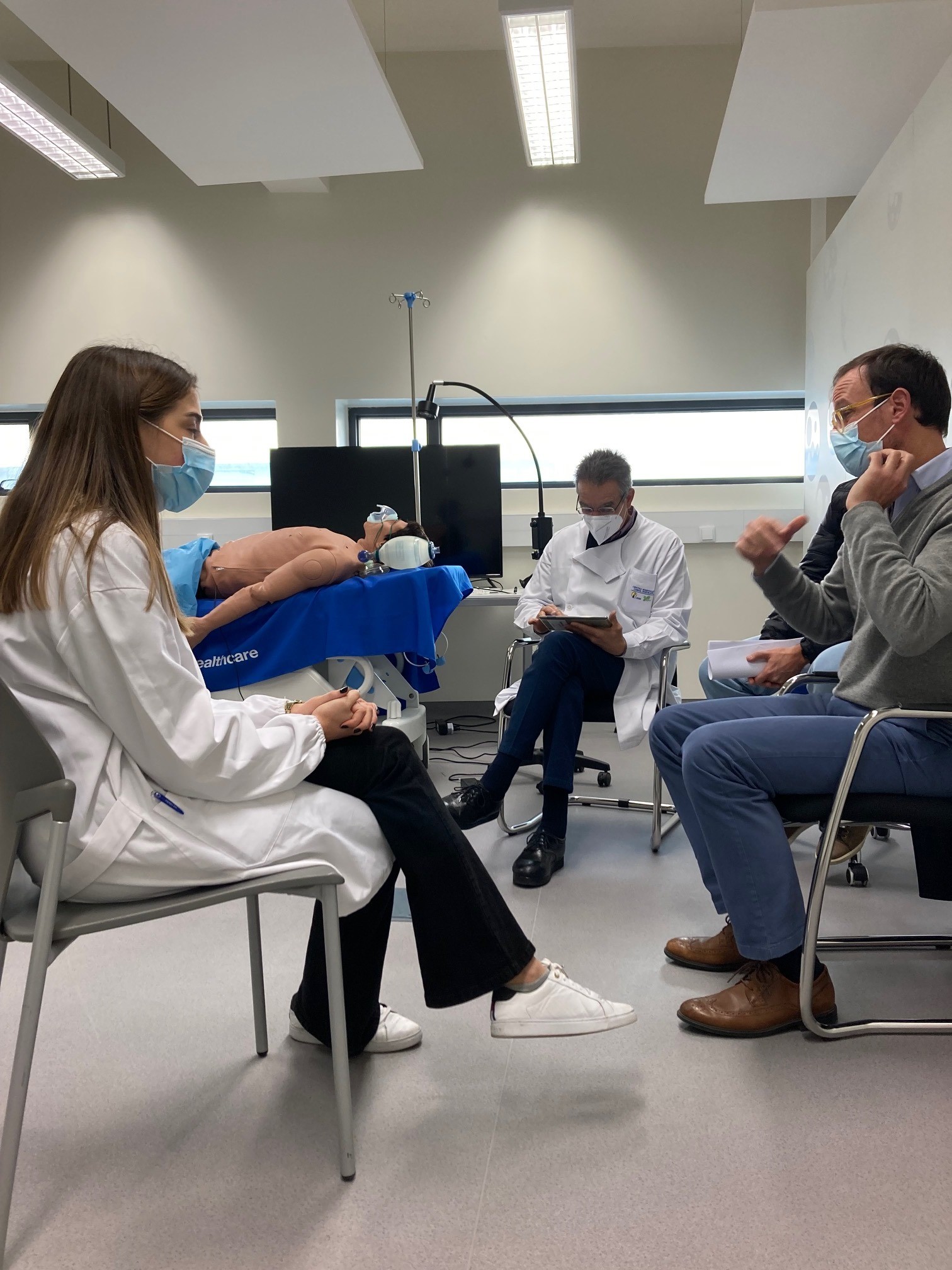
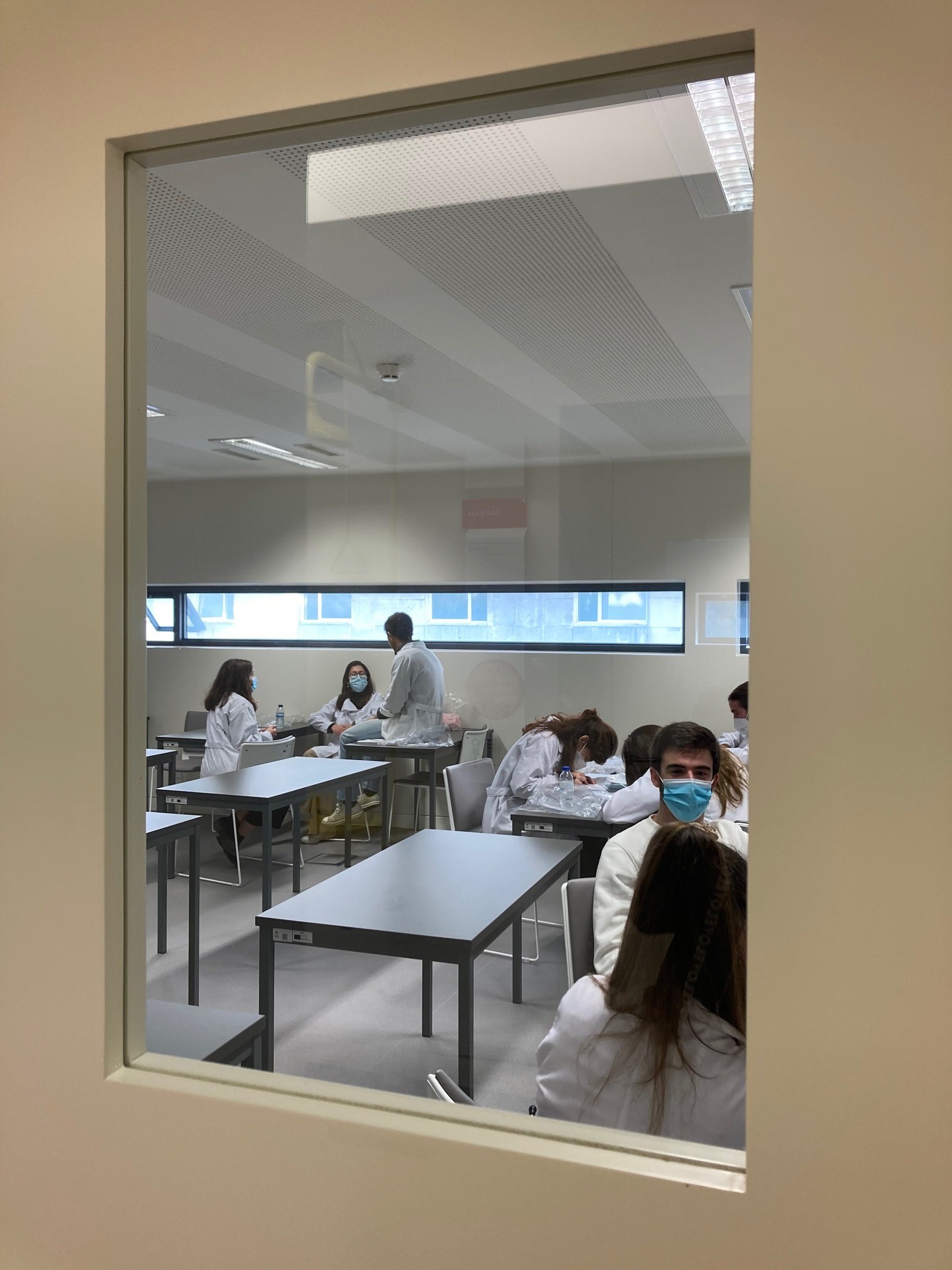
Enthusiastically exchanging impressions in the students' room, we went to feel the pulse of those who were at the centre of the stage. With anxiety levels lowering and after the first impact with the new, one idea came through clearly, the new form of evaluation is to be maintained, for the good of Medicine!
Most positive aspects |
To be improved |
|
Balanced demand from teachers |
Too much waiting time |
| Clear instructions |
Too much time isolated between groups so as not to exchange information |
|
Acceptable time in each station |
Not all subjects are so easy to assess |
|
Preparing for this test is not as stressful |
More rehearsals before final exam |
|
This experience makes perfect sense |
No feedback from teachers at the end |
|
Good organisation |
Some assessments don’t correspond to practical classes |
|
Better evaluation method than written and oral exams |
Too much content to assess in one day |
|
Interaction with teachers is better in this model of evaluation |
Exhausting time for work |
|
Very similar to Psychiatry role-playing |
With this exam in mind lessons need another preparation |
Text: Joana Sousa
Interview: Leonel Gomes
Editorial Team


